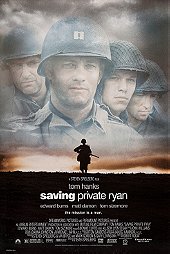Following the Normandy Landings, a group of US soldiers go behind enemy lines to retrieve a paratrooper whose brothers have been killed in action.
Tom Hanks: Capt. John H. Miller
Steven Spielberg continues what he does best with Saving Private Ryan, a film so graphic in its Second World War battlefield depictions that many veterans have called it the closest thing to being there.

The explicit scenes of gushing arteries, severed limbs and faceless corpses come fast and furious, numbing us into the reality of the setting. In fact, if we didn't know Spielberg as a serious artist with noble objectives, we might be tempted to call him a shock artist obsessed with blood, guts, splatter and gore.
Steven Spielberg's genius stems from his ability to always know, exactly where he wants to show his viewer and to transport them there. If he wants to aim for our emotions, he'll make us fall in love with a brown and wrinkly alien we might otherwise find grotesque and scary. If he wants to make us inch the blanket up over our eyes in fear, he'll crank up the grim orchestral music and put us up lose and personal, with a toothy shark nemesis. And if he wants us to truly understand an entirely different kind of horror, he'll show us small children leaping into a pool of outhouse waste, to escape their murderous Holocaust captors. He isn't afraid to dirty his hands with any material he selects.
But what do we do know about Spielberg? We know he would not take us down such a rocky road without a reason. In Saving Private Ryan, the obvious rationalization is to help us understand not where he's coming from, but where the men we will ultimately spend nearly three hours with are coming from. It's in this hell on earth that Cpt. John Miller and his small group of soldiers (fine actors like Edward Burns, Tim Sizemore and Barry Pepper among them) must not only survive with sanity intact, but carry out orders. And not all of those orders make sense at the time, if ever. Case in point, Hanks and his men are sent to locate one Private James Ryan (Matt Damon). Private Ryan is no POW, no casualty, but a soldier still serving somewhere within the vast U.S. Forces, if he's still alive, that is. During WW2, with a communication system that is a technological relic by today's standards.
''My goodness, and my fortress; my high tower, and my deliverer; my shield, and he in whom I trust.''
Each man has a unique background, skill or specialized field. Whether it be an expert marksman or a Jewish veteran and fighter at war. IT all adds to the gritty realism and the taste of war, that your granddad would remember.
The mission they face, is a very hard venture, not just logistically, but emotionally. Private Ryan is sought so he can be sent home to his mom, who has just lost her three other sons virtually at once. As he himself admits, Private Ryan has displayed no more courage than his fellow soldiers. Why should he get to leave? Indeed that question crops up in the minds of Hanks' soldiers. Why is one man's life worth risking those of a group of men? they ask. It's an interesting angle for a film about heroes and rationality. We often think of soldiers doing their job with no questions asked, happy to put their lives on the line for their fellow team mates. We forget they are human beings like us, flesh and blood.
What Saving Private Ryan does extremely well, is show the world the harsh reality of war. Such as letting prisoners go only to return in circulation later, Allied Soldiers killing prisoners or surrendering Nazis because they are bitter and vengeful.
It all shows that the only fairness in war is the unfairness of it. The story about a squad of soldiers sent to retrieve the surviving brother of three dead soldiers is told with competency and due reverence from all perspectives of the characters involved. It is an uncommon and intriguing drama, but it serves as an excuse to describe a setting, rather than the other way around. The story manages to move us through all sorts of different landscapes and scenarios, giving us an unforgettable glimpse of a world unknown to most of us, and terrifying to those who are familiar with it from personal experience.
And therein lies one of the biggest strengths of Saving Private Ryan. It's a very human story told in extreme circumstances. It covers all the traditional struggles like inner turmoil, terror, carnage yet has a level of sophistication absent from most other war films, particularly those inspired by The Last Great War. Hanks isn't Patton, but a schoolteacher, a human being, someone we can relate to, who secretly cries at the enormity of it all. The enemy fighters don't have horns, but uniforms and feelings just like the Americans. The soldiers are heroes, but reluctant ones.
Spielberg is a master at telling the story of war and men. Saving Private Ryan is not his best, but it certainly comes close.
''I just know that every man I kill, the farther away from home I feel.''
10/10
 Login
Login